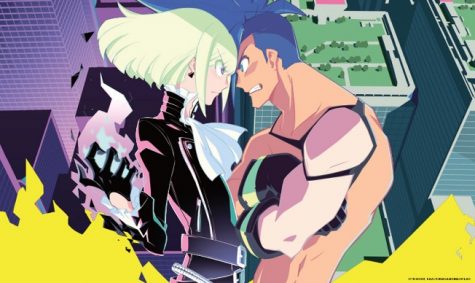The Endearing Absurdity of Promare: An Anime Review
A Love Letter to Trigger Fans
December 6, 2019
I went to the premiere subbed screening of Promare on the 19th of September. Due to daily responsibilities, I was not able to view the dubbed showing, though I have heard positive reactions to it.

There are a lot of words and adjectives I could use to describe the anime film Promare directed by Hiroyuki Imaishi, but none of them surmise it quite as well as one in particular: Trigger. Promare is a quintessential Trigger production. To be frank, if you have seen some of Trigger’s past works such as Kill la Kill, Gurren Lagann, Little Witch Academia, or even Darling in the Franxx, and did not enjoy them, then you will most likely hate this film. For Promare embodies all that Trigger is about; the epic, physics-defying mech battles, visual spectacles worth drooling over, the adrenaline-fueled and blood pumping soundtracks, expansive story plots that don’t take themselves too seriously, and, most importantly, characters that are as ridiculous as they are lovable. But, on the other hand, if you are like me and happen to be a fan of Trigger or a general lover of gorgeous animation, then this film was surely made for you and you should likewise see it. Okay, so with that deliberation now out of the way, what is the story of Promare about? With little to no spoilers of course.
Promare’s story is set in a futuristic Japan, where there is a group of fiery demonic creatures known as the Burnish, who not only terrorize Japan but the entire world. Not much is known about the Burnish other than that they were formerly normal citizens of humanity who, after being pushed past their limits of patience, turn into incensed Burnish beings. To combat this international crisis, a new brand of firefighters is introduced to the world. Sound familiar Fire Force fans? The Kamina-esque main protagonist, Galo Thymos, is one such individual, an idealistic person fighting ever so vigilantly for the control of the Burnish and, subsequentially, the salvation of the world. However, things get interesting, and motivations and prejudices are questioned when Galo, on a mission with his crew, encounters the final remaining free Burnish called the Mad Burnish and their arrogant leader, Lio Fotia.

The plot itself can, as is the case with Trigger productions, delve into sheer ridiculousness and seems to shatter the borders of suspension of disbelief, but the film’s blatant and often humorous self-awareness somehow makes it work. There was one point in the film where it takes an egregious plot device and uses it unabashedly for comedic effect; the theater practically erupted in laughter. Promare knows that it makes little to no sense and does not offend its viewer by asking them to stall disbelief, but simply enjoy the ride. One of the only true indictments I have of Promare’s story is its thematic inconsistency, at one point it tackles themes of discrimination and injustice, at another, the corruption of governmental powers; the moral validity behind ends justify means; or never giving up in the pursuit of what is right. While I appreciate theme diversity, the fact that the film does not explore these themes in any layered or meaningful way feels like a lost opportunity. Also, the story beats and twists are all predictable, but there is a certain satisfaction in fulfilling certain expectations. The film does not attempt to revolutionize anything in the story department, except for certain undertones between the lead characters.
There is plenty of love to be shared amongst the cast of characters, however, the playful but serious dynamic between the two main characters, Galo, who is empathically voiced by Kenichi Matsuyama, and Lio, respectively voiced by Taichi Saotome, is what carries the emotional aspect of this film. Without telling too much, the two characters do not understand each other because they come from two different existences. It is because of this circumstance that they are pitted against one another, not necessarily because they want to be. Both characters are very headstrong in their ideals, values, and motivations and are likewise developed from beginning to end.
For a Trigger produced film, there is a surprising lack of romance in the film and even less fan service, though there are shades of homoeroticism between the two central characters. This has been welcomed by Yaoi and LGBTQ+ members of the fandom alike. So much so, that a person in my theater screamed in excitement over a particular scene, to which the rest of the audience busted out in laughter and applause. It was a cool moment. Despite this, by the film’s end, it seems to cop out of its earlier promises. I can appreciate subtly in storytelling and do not care for an excess of melodramatics, but if you are going to tease the audience with something, fulfill it instead of backtracking to a safe position.

From a visual standpoint, Promare is an artistic achievement. The art just pops, which is mainly due to the bolded black outlines of the characters and some of the environments. It makes the expressions and the physical features of the characters that much more prominent and spectacular to watch. It seems Japan is finally catching on to the uses of CG because this film is absolutely jaw-dropping in how it combines 2D, 3D, and CG art and animation into a wonderful blend. Action in Promare is great, seamless, and carries meaning per its varying themes. Although there are some moments where some 2D figures or objects do not figure pleasingly with the 3D backgrounds, the world of Promare is aesthetically fulfilling. The film also gets into a habit of using this rotating, sometimes panning shot, which can sometimes be jarring, but otherwise, the direction is smooth.
The music for this film, composed by Hiroyuki Sawano, is just as mind-boggling as the visuals. If you are aware of Sawano and his music, then you know that, on the Mount Rushmore of anime composers, Sawano sits close to Yoko Kanno. The music is classic Sawano in its bombastic nature and its predictably satisfying drop beats, but it remains fresh by masterfully balancing the techno flavors with the orchestral. Throughout the film, it felt as though Sawano’s music played a role that of a character, weaving, flowing, and rising with the pace of the characters and plot. I would go as far as to say that even without the emotional weight of the characters present, the visuals combined with the music is worth seeing alone.
Promare is why I love anime. It is fun, action-packed, visually stunning, and unapologetically anime. Not only is it one of the better anime films I have seen in the past year or so, but movies in general; of which included a theater experience I will not be forgetting any time soon. If the school semester has you drained and you are looking for an escape from reality for a few hours, you cannot get much better entertainment than Promare. The film rereleases on 12/08 (subbed) and 12/10 (dubbed), respectively.





